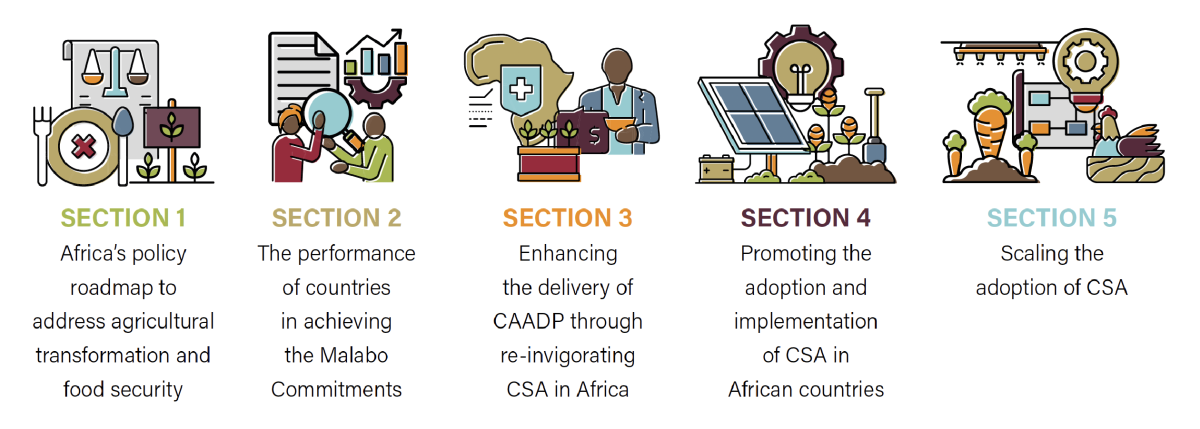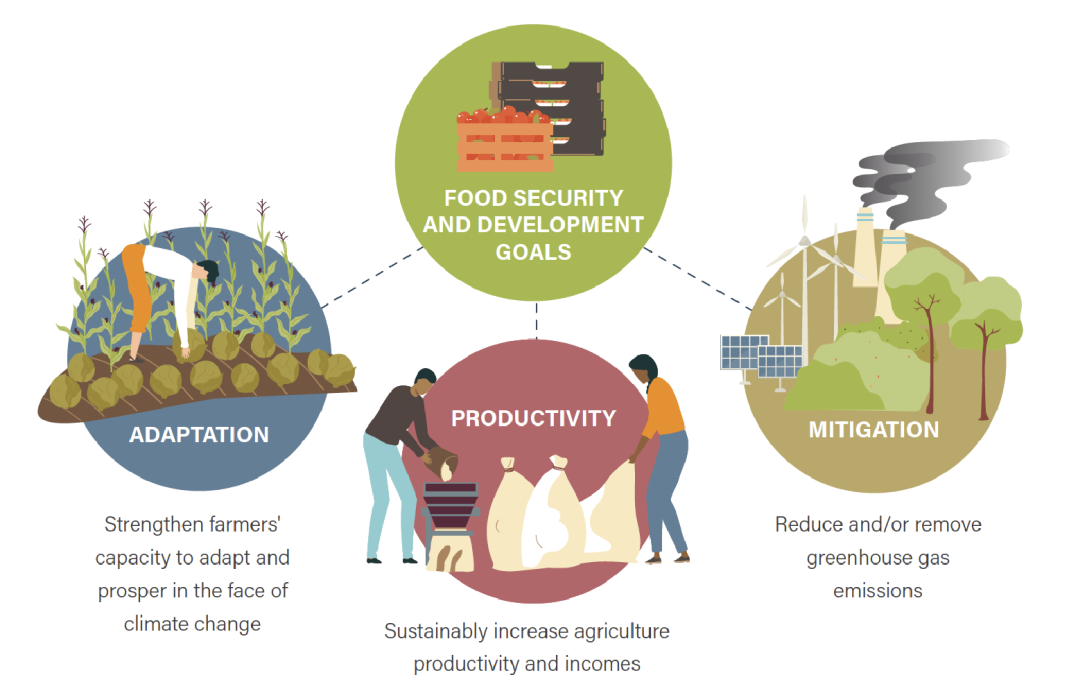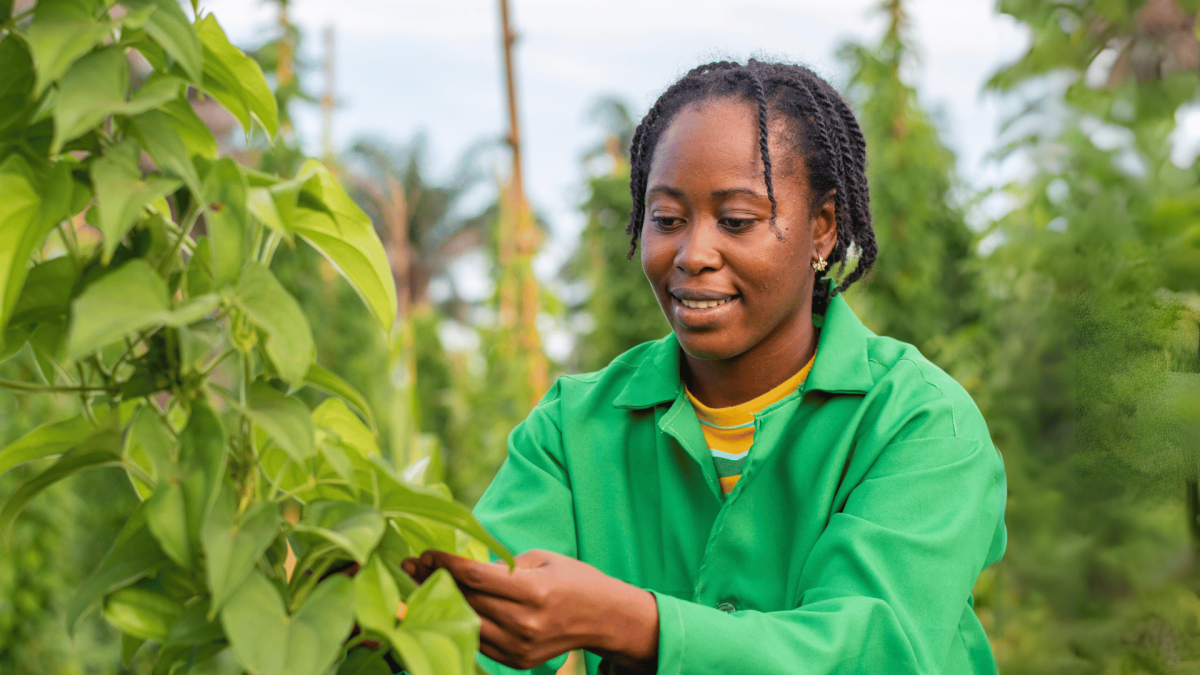Africa is not currently on track to meet the goals set out in the Malabo Declaration. But climate-smart agriculture offers a viable – and scalable – path to a more resilient and food-secure future for the continent. In a new briefing paper developed in partnership with Accelerating Impacts of CGIAR Climate Research for Africa (AICCRA), AUDA-NEPAD presents practical tools and recommendations for African countries to develop the technical policy and investment conditions to achieve sustainable agricultural development under climate change.
The 3rd African Union Biennial Review Report (2022) of the Comprehensive Africa Agricultural Development Programme (CAADP) revealed that African countries are not on track to meet individual national commitments towards agricultural transformation and climate resilience. As the impacts of climate change continue to build and affect the continent’s most vulnerable, the time for action is now.
African countries need to move beyond discussions and negotiations to start taking tangible steps in intervention areas that can accelerate CAADP implementation and support Africa in building a resilient and sustainable food system.
A growing evidence base demonstrates that climate-smart agriculture (CSA) can play a key role in achieving this. By addressing the interlinked challenges of food security, farmer resilience and productivity, in the context of climate change adaptation and mitigation, CSA interventions offer key opportunities for countries to practically accelerate the CAADP agenda, as well as deliver on the recommendations of the recent Biennial Review.
Climate-smart collaborations for impact
AUDA-NEPAD, in partnership with experts from the Accelerating Impacts of CGIAR Research for Africa (AICCRA) project, has synthesised key learnings from current CSA research and pilot projects to develop practical guidance and key recommendations for member countries – and Africa at large – to implement a comprehensive CSA approach.
The briefing paper, Scaling Climate-Smart Agriculture for accelerated agri-food systems transformation in Africa, is an outcome of AUDA-NEPAD’s commitment to supporting continental agriculture development for a food-secure future for Africa.
“This paper provides practical tools and suggestions for African countries to develop the technical policy and investment conditions to achieve sustainable agricultural development for food security under climate change. These tangible actions can in turn lead to more resilient and inclusive food system approaches, which will in turn support the continent on its journey towards a low emission, climate-resilient and inclusive development future.” H.E Ms. Nardos Bekele-Thomas, the CEO of the African Union Development Agency (AUDA-NEPAD) explained.
The targeted recommendations and guidelines presented in the paper demonstrate how climate-smart agriculture – evidenced through activities undertaken through the AICCRA project with the backing of CGIAR science and experts – can have a transformative effect on the success and sustainability of food systems.

Why focus on climate-smart agriculture?
More than a set of farming practices, the objectives of climate-smart agriculture are well aligned to support the intervention areas of the AU’s long-term development plan, namely, the intervention areas outlined in the Common Africa Position on Food Systems, and AU’s long-term Agenda 2063.
There is a large evidence base and many case examples that highlight the benefits climate-smart agricultural (CSA) approaches and innovations can bring to the continent. Through enhanced planning, integration, ownership, implementation and scaling, CSA offers African countries practical solutions to realise the goals set out in national agricultural and development plans, the CAADP Agenda, and more broadly within the continent’s Agenda 2063.

However, while CSA is now widely embraced as a guiding framework for adaptation and mitigation action for the agricultural sector, the current pace of uptake is insufficient to meet the challenges and needs facing the continent. Despite successful projects and initiatives, the adoption and scaling of CSA technologies and practices across many countries in Africa remains low.
To pave the way for climate-compatible agricultural transformation, accelerated action is needed to boost the environment needed for CSA adoption, scaling, and financing, including the support for capacity building and training.
The new report discusses successful country cases and highlights the necessary enabling conditions for effective CSA scaling. It also suggests key areas of focus for countries hoping to adopt, scale and finance these innovative practices to strengthen policy coherence, build capacity development and inclusion, enhance partnerships and dialogue, support research and development and market access and increase financial provisioning.
Looking forward to 2063
Climate-smart agriculture practices, services and technologies, if adopted and scaled effectively, can advance Africa’s agricultural productivity, increase its climate change adaptation and mitigation potential and ultimately enhance the resilience of Africa’s food systems.
This serves as a call to African governments to support and strengthen actions that prioritise increased productivity, resilience and livelihoods opportunities of smallholder farmers.
African countries are up to the challenge of transforming the continent’s agri-food systems, in turn delivering on CAADP and Malabo Commitments and helping Africa to achieve its agricultural transformation agenda.
This article was initially published on AUDA-NEPAD and has been revised to suit Farming First’s editorial guidelines.



